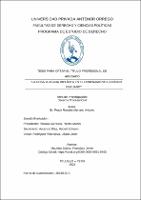| dc.contributor.advisor | Mauricio Juárez, Francisco Javier | |
| dc.contributor.author | Prado Rosales Mariano Antonio | |
| dc.creator | Prado Rosales, Mariano Antonio | |
| dc.date.accessioned | 2024-01-12T14:57:00Z | |
| dc.date.available | 2024-01-12T14:57:00Z | |
| dc.date.issued | 2024 | |
| dc.identifier.uri | https://hdl.handle.net/20.500.12759/17931 | |
| dc.description.abstract | Esta investigación tiene como objetivo demostrar que resulta necesario extender
los alcances de la cosa juzgada en la legislación peruana, debido a que la actual
regulación puede conllevar al inicio de procesos innecesarios que vulneran los
principios de economía y celeridad procesal, así como el derecho a la tutela
jurisdiccional efectiva.
En el transcurso de esta investigación, se ha determinado que la regulación de la
cosa juzgada en el ordenamiento jurídico peruano, si bien es cierto cumple con una
función negativa, la cual impide que se vuelvan a tramitar procesos sobre un mismo
caso dos veces, esta función no está del todo cubierta debido a la forma en que se
ha legislado la cosa juzgada en nuestro marco legal, el cual permite que se pueda
ventilar una misma cuestión en procesos distintos, esto nos llevó al siguiente
enunciado: ¿De qué manera resulta necesario regular en el Perú la cosa
juzgada implícita a efectos de no generar nuevos procesos judiciales? En
función a ello, después de haber realizado el estudio correspondiente, se considera
que la regulación actual en nuestro ordenamiento jurídico vigente carece de
algunos alcances y efectos que conllevan a la vulneración de los principios de
economía y celeridad procesal, así como el derecho a la tutela jurisdiccional
efectiva.
Para la realización de la presente investigación, se aplicó el método análisis síntesis, el método hermenéutico, método comparativo y el método deductivo.
Principalmente, se ha procedido a comparar las formas en las que se regula la cosa
juzgada en legislaciones extranjeras como las de Colombia y España para de esta
manera explicar los beneficios que generarían la regulación de la cosa juzgada
implícita en caso de regularse en Perú.
Por último, con los resultados obtenidos de las comparaciones realizadas, se ha
determinado que la regulación actual de la cosa juzgada puede suponer el inicio de
procesos respecto a una misma controversia. | es_PE |
| dc.description.abstract | This research aims to demonstrate that it is necessary to extend the scope of res
judicata in Peruvian legislation, because the current regulation can lead to the
initiation of unnecessary processes that violate the principles of economy and
procedural speed, as well as the right to effective jurisdictional protection.
In the course of this investigation, it has been determined that the regulation of res
judicata in the Peruvian legal system, although it is true, fulfills a negative function,
which prevents processes on the same case from being processed twice, this
function is not fully covered due to the way in which res judicata has been legislated
in our legal framework, which allows the same issue to be aired in different
processes, this led us to the following statement: In what way is it necessary regulate
implicit res judicata in Peru in order to not generate new judicial processes? Based
on this, after having carried out the corresponding study, it is considered that the
current regulation in our current legal system lacks some scope and effects that lead
to the violation of the principles of economy and procedural speed, as well as the
right to effective jurisdictional protection.
To carry out this research, the analysis-synthesis method, the hermeneutic method,
the comparative method and the deductive method were applied. Mainly, we have
proceeded to compare the ways in which res judicata is regulated in foreign
legislation such as those of Colombia and Spain in order to explain the benefits that
the regulation of implicit res judicata would generate if regulated in Peru.
Finally, with the results obtained from the comparisons carried out, it has been
determined that the current regulation of res judicata may lead to the initiation of
processes regarding the same controversy. | es_PE |
| dc.description.uri | Tesis | es_PE |
| dc.format | application/pdf | es_PE |
| dc.language.iso | spa | es_PE |
| dc.publisher | Universidad Privada Antenor Orrego | es_PE |
| dc.relation.ispartofseries | T_DERE_638 | |
| dc.rights | info:eu-repo/semantics/openAccess | es_PE |
| dc.rights.uri | https://creativecommons.org/licenses/by/4.0/ | es_PE |
| dc.source | Universidad Privada Antenor Orrego | es_PE |
| dc.source | Repositorio Institucional - UPAO | es_PE |
| dc.subject | Cosa juzgada | es_PE |
| dc.subject | Tutela Jurisdiccional | es_PE |
| dc.title | La cosa juzgada implicita en el ordenamiento jurídico peruano | es_PE |
| dc.type | info:eu-repo/semantics/bachelorThesis | es_PE |
| thesis.degree.level | Título Profesional | es_PE |
| thesis.degree.grantor | Universidad Privada Antenor Orrego. Facultad de Derecho y Ciencias Politicas | es_PE |
| thesis.degree.name | Abogado | es_PE |
| thesis.degree.discipline | Derecho | es_PE |
| dc.subject.ocde | https://purl.org/pe-repo/ocde/ford#5.05.00 | es_PE |
| renati.advisor.orcid | https://orcid.org/0000-0003-0951-0405 | es_PE |
| renati.author.dni | 70667176 | |
| renati.advisor.dni | 03675300 | |
| renati.type | https://purl.org/pe-repo/renati/type#tesis | es_PE |
| renati.level | https://purl.org/pe-repo/renati/level#tituloProfesional | es_PE |
| renati.discipline | 421016 | es_PE |
| renati.juror | Rebaza Carrasco, Héctor Martín | |
| renati.juror | Ascencio Díaz, Hubert Edinson | |
| renati.juror | Rodríguez Villanueva, Liliana Janet | |
| dc.publisher.country | PE | es_PE |




